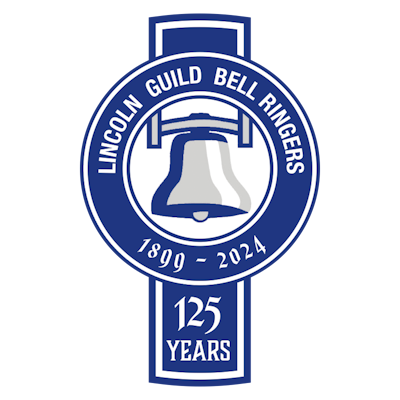Guild 6-Bell Striking Competition at Whaplode and Moulton
10th September 2016
10th September 2016
I've never organised a striking competition before, so I was a bit apprehensive as I approached Whaplode with 2 of my ringers. The weather wasn't helping much either. It was frankly a foul day. As I pulled up outside St Mary's church, a gentleman appeared from a mobile home who I identified as Tom Ridgman, one of the judges. Shortly afterwards I found the other judge Philip Bailey in the car park and we all went into the church along with Roy Willingham the local steward for the competition. After I had furnished the judges with a copy of the rules I set up the tower (install a clock and some squared paper for counting rows of changes) and made sure copies of the rules and the running order were posted in a prominent position.
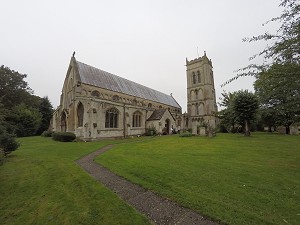 |
It was getting on for about 4:50pm and the competition would be starting in 10 minutes. We installed Philip in the car park to judge the Plate competition and Tom and I made our way over to Moulton where the Cup competition was being held. We were met at All Saints church by Philip Green, who escorted Tom to a suitable spot in the garden of John Hayes (Minister of State at the Department of Transport). I made my way in to the church and met up with the Messingham/Scotter team who were first up to ring. Once Philip Green came back to say the judge was ready, the Messingham/Scotter team went up to start their practice. It was 5:10pm, 10 minutes after the competition should have started. Not an auspicious start to my first ever striking competition.
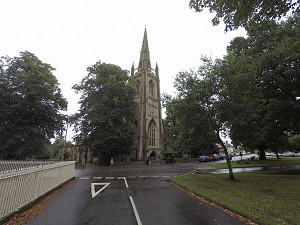 |
There was tea and coffee being served in the church, so I had a cup of coffee while listening to the ringing. It sounded good. Outside the church the bells were very loud and I was a bit worried about how loud they might be in the ringing room. I dug out a set of earplugs just in case my Tinnitus decided to play up.
Messingham/Scotter finished their test piece and I made my way up the tower with my team. Philip Green had got things slickly organised so that the next team went up before the previous team came down, which would save a bit of time. The departing team pointed out the location of the treble and the fact that we really needed the well-insulated door firmly shut if we wanted a sensible volume level. Earplugs on standby!
Once the tower was clear, we closed the door and got ourselves organised. I set the timer on my phone for 3 minutes and then we set off on our practice. The volume level was OK and I didn't feel the need to reach for my earplugs. We rang a course of Bob Doubles plus some plain hunt on 5 to take us right up to our 3 minutes. They are nice bells at Moulton, a bit on the heavy side but really nice.
After establishing that everyone was OK and no boxes were required, Tierney dinged the treble a couple of times to signal the judge and we set off into our test piece of 2 extents of Plain Bob Doubles. There were no catastrophes (like we had at the branch 6 bell) and we completed the test piece.
After we had stood the next team appeared. We passed on the good advice and made our way down. After chatting to some of the other ringers we made our way back to Whaplode where tea was to be served and the results would be announced. As we parked up at Whaplode the last team in the Plate competition was just finishing their test piece. The bells stood and there was silence, apart from the faint sound of bells. Crickey! That was Moulton 1.5 miles away. They really are loud.
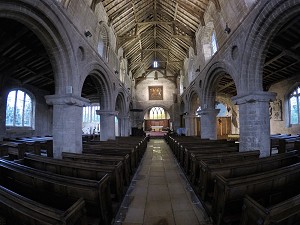 |
In the church, Roy Willingham had got tea organised and ensuring everyone who had ordered a tea was catered for. Tea was a plated up ham or quiche salad, with a roll and butter. We sat in the kitchen area and ate our tea and consumed more tea and coffee.
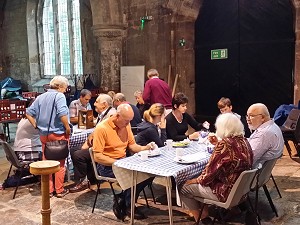 |
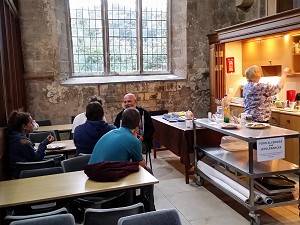 |
Unfortunately due to a clash with the local film club in the Village Hall, we were unable to ring the bells at Whaplode after the competition as originally intended, so we sat about and socialised with our fellow ringers until shortly after 7:30pm when the judge from Moulton returned and had a bite to eat.
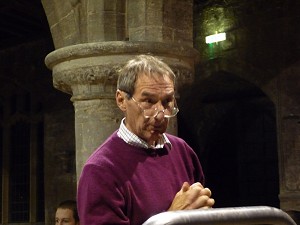 |
Alan Payne, the Guild Master called the members to order. Before introducing the judges, Sue Faull announced that the Guild Calendar and Guild Christmas cards were now ready and available.
The Edward Colley Plate
Alan introduced the first judge who had judged the Plate competition at Whaplode. This was Philip Bailey of the Ely Diocesan Association of Church Bell Ringers. Philip is the Education Officer for the Ely Diocesan Association. He is also the Ringing Master for the Ely District (the equivalent of one of our branches)
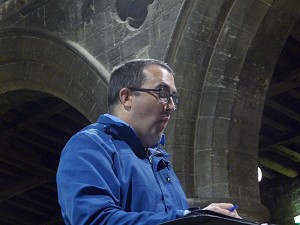 |
Philip said it had been a very wet trip over the border. He congratulated all 3 teams who had entered. It can be both tedious and nerve wracking entering a striking competition. However it is good experience ringing on other bells and ringing with other people. Philip felt that the middle bells might be a bit odd struck. Also his advice was to ring plenty of rounds to get settled before embarking on the test piece. Bands should make the maximum use of their 3 minutes practice. Philip felt that 3 minutes was a bit short for a practice time. In the Ely DA they have 5 minutes practice time. All bands rang at least 240 changes and in fact rang a few more than that.
Comments
Team 1: Stow/Willingham (West Lindsey Branch)
This team used all 3 mins practice. The judge felt that they found the bells a bit challenging at the start. Some longer rounds at the beginning of the test piece might have helped it to settle down. Once it settled down it was a nice piece of ring especially when the 5 was leading.
Team 2: Gratham/Barrowby (Southern Branch)
This team only used 2.5 minutes of its practice time. They went straight into changes, not much rounds before the test piece. Nice piece of ringing. Fun bit of 65's at the end.
Team 3: Ingoldmells (Eastern Branch)
This team used all of the 3 mins of practice. Very nice piece of ringing.
Results
| 1st Place | Team 3 | Ingoldmells (Eastern) | 8 faults |
| 2nd Place | Team 2 | Grantham/Barrowby (Southern) | 16 faults |
| 3rd Place | Team 1 | Stow/Willingham (West Lindsey) | 44 faults |
A representative from Grantham came up to receive the runners up plaque on behalf of the band. Bill Brotherton came up on behalf of the Ingoldmells team to receive the Edward Colley Plate.
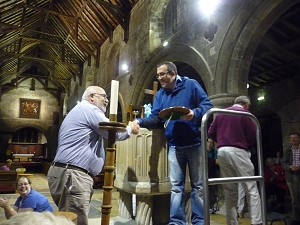 |
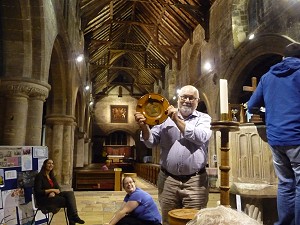 |
on behalf of the Ingoldmells team |
on behalf of the Ingoldmells team |
The John Freeman Cup
Alan Payne then introduced the judge for the Cup competition who was Tom Ridgman. Tom is the son of Bill Ridgman who instigated the Ridgman trophy. He is the Chairman of the Ely Diocesan Association and also their Bell Advisor.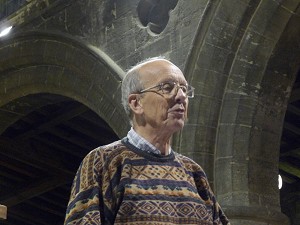 |
Tom congratulated everyone for taking part. Such Competitions play an important part in improving striking and striking is what the public hear. The bells were quite loud in the garden where Tom was judging. He felt they were quite a challenging set of bells for a striking competition, what with being a 15cwt ring of the bells. There are several techniques that are key to ringing well. One is a steady tenor especially on heavy bells. There is not a lot of opportunity to float the tenor if things bunch up. Also clear leading off the tenor and ringing by rhythm not rope sight. Given the weight of the bells it was best not to rush the ringing.
Comments
Team 1: Messingham/Scotter (West Lindsey Branch)
Made good use of the practice. Settled well. Had a bit of a trip in the 6th/7th lead
Team 2: Waddington/Washingborough (Central Branch)
Had a bit of difficulty in the practice keeping the tenor up. 3 minutes is a bit of a short practice time really. Also had a trip in the 6th/7th lead. Settled very nicely in the middle. Started rushing a bit after that which made it a bit uneven.
Team 3: Grimsby (Northern Branch)
Rang Plain Hunt. Took a little time to settle down. Also tripped in the 7th lead. Quite well struck but a little bit of irregularity in the rhythm.
Team 4: Bourne (Southern Branch)
This was a more ambitious band. They rang quite fast. The piece tended to lack definition. It was quite difficult to pick the leads out. Other than that, a good piece of ringing.
Team 5: Cathedral (Central Branch)
Very good practice but a bit of a nervous start to the test piece. It settled down nicely but there was some rushed leading.
Team 6: Kirton-in-Holland (Eastern Branch)
This band rang at a slightly slower pace. Generally very consistent ringing throughout.
Results
| 1st Place | Team 6 | Kirton-in-Holland (Eastern) | 45 faults |
| 2nd Place | Team 5 | Messingham/Scotter (West Lindsey) | 55 faults |
| 2nd Place | Team 1 | Cathedral (Central) | 55 faults |
| 4th Place | Team 4 | Bourne (Southern) | 57 faults |
| 5th Place | Team 3 | Grimsby (Northern) | 65 faults |
| 6th Place | Team 2 | Waddington/Washingborough (Central) | 101 faults |
The Plaque for runners up was jointly presented to representatives of both the Messingham/Scotter and Cathedral bands. It was suggested that they should hand it over to the other team after 6 months.
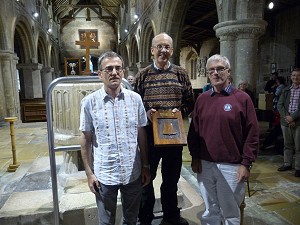 |
(Messingham/Scotter) accept the runners up plaque in the Cup competition |
Alan then asked for a representative from Kirton-in-Holland to come up to receive the Cup. There was a short silence and then someone piped up "They've gone home!". It then transpired that they had left early to attend a concert. In their absence the Cup was presented to Helen Brotherton who would pass it on to the Kirton-in-Holland team.
 |
on behalf of the Kirton-in-Holland team |
The competition now over, Alan Payne thanked the judges once again and the local ringers for organising refreshments at both towers and the members for turning out to ring in the competition.
There was an opportunity to take some pictures of the winning teams. Obviously a picture of the Kirton-in-Holland team was not possible, but we were able to get a picture of the Ingoldmells team who won the Plate.
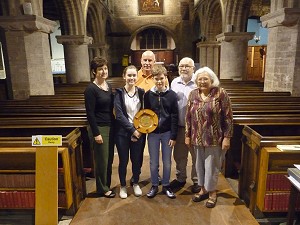 |
Isabelle Barker, Clare Barker, Tony Barker, James Barker, Bill Brotherton, Helen Brotherton |
Jonathan Clark (webmaster)
